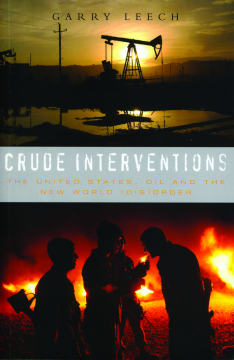
Additional Information
Book Details
Abstract
At the beginning of the 21st century, a new world disorder is emerging in which battles over resources are playing an increasingly prominent role. The importance of oil to this picture is underscored by the unilateral and militaristic foreign policy of the world's largest power in its attempt to secure access to this critical resource. In this global context, oil-rich communities of the South are being drawn into struggles to defend their sovereignty, cultural integrity, human rights and threatened ecosystems.
Crude Interventions examines the military and economic policies of the Bush administration in oil-rich regions of the world. More precisely, it examines the socio-economic and human rights consequences of these policies, as well as those of recent US administrations and multinational energy companies, for the peoples of oil producing nations in the global South. With only four percent of the world's population, the United States consumes 25 per cent of global energy production. This thirst for energy has played a significant role in determining US foreign policy in recent decades. The desire to secure access to reliable supplies of oil has played an even more prominent role in determining the foreign policy of the government of George W. Bush than previous administrations.
By focusing on the US role in Iraq, Central Asia, West Africa, Colombia and Venezuela, Crude Interventions makes evident the connections between US energy interests, the war on terror, globalization, human rights abuses and other social injustices endured by those peoples of the South cursed with an abundance of the world's most sought after resource.
Garry Leech is a journalist and editor of Colombia Journal (www.colombiajournal.org). He is also a lecturer in the Department of Political Science at Cape Breton University and author of Killing Peace: Colombia's Conflict and the Failure of U.S. Intervention (Inota, 2002).
'Excellent and timely'
Noam Chomsky
'...provides a useful basic primer on US military, economic, and corporate interventions in the world. His book and his online journal (www.colombiajournal.org) is clearly written and very useful in getting up to speed. He also provides detailed references and footnotes for those who want to pursue matters further....clear and succinct style...In truth the important task Leech takes on, he does well: opens the door to seeing one of the world's most urgent issues in context, and from the point of view of some of those who suffer the most.'
Znet, Jan 2007
'In this useful book, journalist and lecturer Garry Leech shows how oil, not concern for promoting democracym drives the U.S. to intervene in countries across the world. He looks at the damaging effects of U.S. interventions in the Middle East, Central Asia, West Africa and Latin America.'
Will Podmore, Morning Star
Table of Contents
| Section Title | Page | Action | Price |
|---|---|---|---|
| Cover | Cover | ||
| Contents | v | ||
| Acknowledgements | vii | ||
| Introduction | 1 | ||
| 1 | Iraq: seeking the riches of Babylon | 8 | ||
| The rise of Saddam Hussein | 9 | ||
| US–Iraqi relations in the 1980s | 16 | ||
| The Gulf War and UN sanctions | 22 | ||
| The US invasion and occupation | 29 | ||
| The neo-liberal restructuring of Iraq | 41 | ||
| Conclusion | 50 | ||
| 2 | Central Asia: the Silk Road strategy | 52 | ||
| The Islamic revival | 56 | ||
| Kazakhstan: the economic opening | 59 | ||
| Azerbaijan: the new oil boom | 69 | ||
| Turkmenistan: going against the flow | 76 | ||
| Militarization of the region | 80 | ||
| Conclusion | 88 | ||
| 3 | West Africa: exploiting the other gulf | 90 | ||
| Nigeria: the land of no tomorrow | 91 | ||
| Angola and the corrupting commodity | 107 | ||
| Washington’s role in West Africa | 115 | ||
| Conclusion | 120 | ||
| 4 | Colombia: feeding Washington’saddiction | 122 | ||
| The roots of the conflict | 123 | ||
| From drugs to terror | 127 | ||
| The national security state | 137 | ||
| The great oil giveaway | 147 | ||
| The oil war in Arauca | 151 | ||
| The oil war in Putumayo | 160 | ||
| Conclusion | 164 | ||
| 5 | Venezuela: an alternative for the twenty-first century? | 167 | ||
| Oil in the back yard | 168 | ||
| The political reformation | 178 | ||
| The Bolivarian revolution | 193 | ||
| The US response | 205 | ||
| Conclusion | 214 | ||
| Conclusion | 217 | ||
| Notes | 223 | ||
| Introduction | 223 | ||
| 1 Iraq | 223 | ||
| 2 Central Asia | 226 | ||
| 3 West Africa | 229 | ||
| 4 Colombia | 231 | ||
| 5 Venezuela | 236 | ||
| Conclusion | 239 | ||
| Bibliography | 240 | ||
| Index | 241 |
